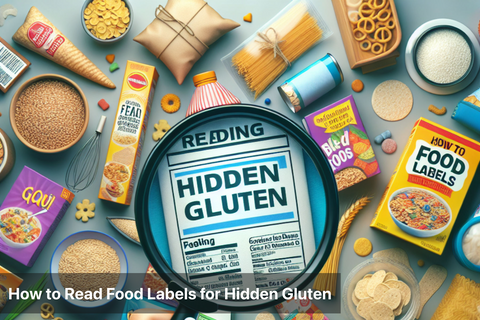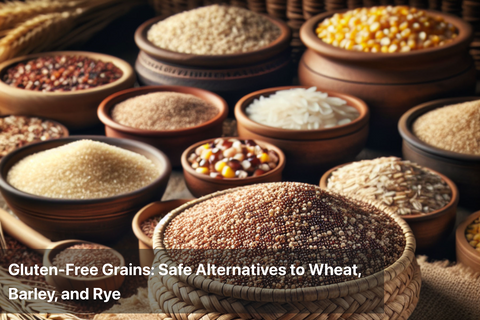
What is gluten?
Gluten refers to a group of proteins found in wheat, barley, and rye. These proteins play a crucial role in the texture, structure, and elasticity of various food products.
When we talk about gluten, we are essentially referring to the composite of gliadin and glutenin proteins. These proteins give dough its sticky consistency and are responsible for the chewy texture in bread and baked goods. For individuals with gluten intolerance or celiac disease, gluten can trigger adverse reactions and lead to serious health issues.
Understanding the meaning of gluten is important, especially for those who need to follow a gluten-free diet. By recognizing the significance of gluten in food products, individuals can make informed choices about their dietary intake and explore alternative ingredients that align with their nutritional needs.
In essence, gluten is not just a trendy topic but a key element in the composition of many staple foods. As we delve deeper into the realm of gluten and its implications, it becomes evident that awareness and education are vital for making informed decisions about our dietary habits.

Health Effects of Gluten
-
Celiac Disease – Autoimmune reaction causing damage to the small intestine, leading to malabsorption and various symptoms like diarrhea, abdominal pain, and fatigue.
-
Non-Celiac Gluten Sensitivity – Symptoms similar to celiac disease (e.g., bloating, fatigue) without the autoimmune damage; symptoms improve with a gluten-free diet.
-
Wheat Allergy – Allergic reaction to proteins in wheat (including gluten), causing symptoms like hives, swelling, and respiratory issues.
-
Digestive Issues – Gluten can cause digestive discomfort in sensitive individuals, including bloating, gas, and diarrhea.
-
Inflammation – In some people, gluten can trigger inflammation and contribute to chronic conditions, even without celiac disease.
-
Neurological Symptoms – Some individuals report headaches, brain fog, and mood changes related to gluten consumption.
-
Nutrient Absorption – In celiac disease, gluten damage impairs nutrient absorption, leading to deficiencies in iron, calcium, and other essential nutrients.
-
Autoimmune Conditions – Gluten exposure can exacerbate other autoimmune diseases in susceptible individuals.
-
Weight Management – For some, removing gluten may help manage weight, although a gluten-free diet is not necessarily lower in calories or healthier.
-
General Well-Being – For those with gluten intolerance or celiac disease, a gluten-free diet can improve overall well-being and quality of life.
Gluten-Free Diet and Alternatives
|
Category |
Gluten-Containing Foods |
Gluten-Free Alternatives |
|---|---|---|
|
Grains |
Wheat, barley, rye |
Rice, quinoa, millet, buckwheat, amaranth |
|
Flours |
All-purpose flour, whole wheat flour |
Almond flour, coconut flour, rice flour, oat flour (certified gluten-free) |
|
Pasta |
Wheat pasta, semolina pasta |
Gluten-free pasta (rice, corn, quinoa-based) |
|
Bread |
Whole wheat bread, white bread |
Gluten-free bread (made from rice, almond, or coconut flour) |
|
Cereals |
Wheat-based cereals, muesli |
Gluten-free cereals (corn flakes, rice-based cereals) |
|
Baking Mixes |
Regular cake and cookie mixes |
Gluten-free baking mixes (for cakes, cookies) |
|
Snacks |
Pretzels, crackers (made with wheat) |
Gluten-free snacks (rice cakes, gluten-free crackers) |
|
Sauces & Condiments |
Soy sauce, some dressings and sauces |
Tamari (gluten-free soy sauce), vinegar, gluten-free dressings |
|
Beer |
Regular beer (made with barley) |
Gluten-free beer, cider, or alcohol (made from gluten-free grains) |
|
Soups |
Some soups (containing gluten) |
Gluten-free soups or homemade broths |

Gluten 101: A Simple Guide
After delving into the realm of gluten and its impact on dietary choices, it becomes evident that gluten plays a significant role in various dietary restrictions. As we explored the meaning of gluten, it was revealed that this protein composite found in wheat, barley, and rye can pose challenges for individuals with gluten intolerance or celiac disease.
Understanding the implications of gluten on health is crucial for those affected by these conditions. By opting for a gluten-free diet, individuals can actively manage their health and well-being. This dietary shift involves steering clear of gluten-containing products and exploring suitable alternatives.
Moreover, the significance of gluten extends beyond mere food composition; it can profoundly influence the lifestyle and dietary decisions of many. Those with gluten sensitivities must navigate their food choices carefully to maintain a healthy and balanced diet.
In essence, grasping the essence of what gluten means and its implications for dietary restrictions empowers individuals to make informed choices about their food consumption. Embracing a gluten-free lifestyle can lead to improved health outcomes and a better quality of life for those with gluten-related conditions.
FAQs
-
What is gluten?
Gluten is a group of proteins found in wheat, barley, and rye. It gives elasticity to dough and helps it rise.
-
Is gluten harmful for everyone?
While most people can consume gluten without any issue, individuals with celiac disease or gluten sensitivity need to avoid gluten-containing foods.
-
What are common sources of gluten?
Common sources of gluten include bread, pasta, cereals, and baked goods made from wheat, barley, or rye.
-
How does gluten affect people with celiac disease?
For individuals with celiac disease, consuming gluten triggers an autoimmune response that damages the small intestine, leading to various health issues.
-
Is gluten-free diet necessary for everyone?
A gluten-free diet is essential for individuals with celiac disease, gluten sensitivity, or wheat allergy. Otherwise, it is not necessary to avoid gluten.
This Blog post is an initiative by Lo! Foods, to provide accurate and Nutritionist / Doctor approved information related to Health. Lo! Foods is India's leading brand for Everyday Functional Foods. Foods designed for specific Health conditions or Needs. Lo! Foods also runs India's largest range of Low Carb Healthy Cloud Kitchens, under the brand names of Lo!, ProteinChef, ATH (All Things Healthy) and DiabeSmart.















Leave a comment
Your email address will not be published.